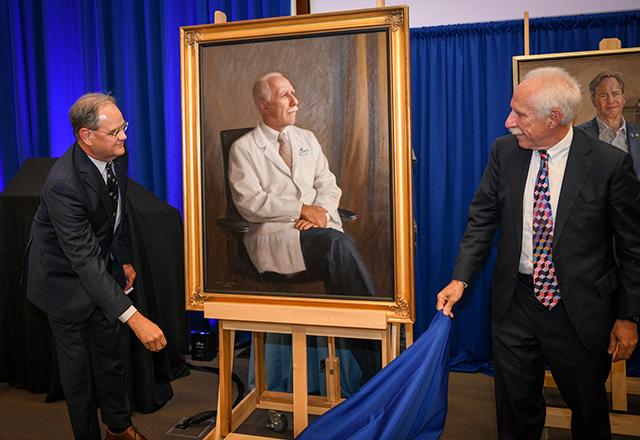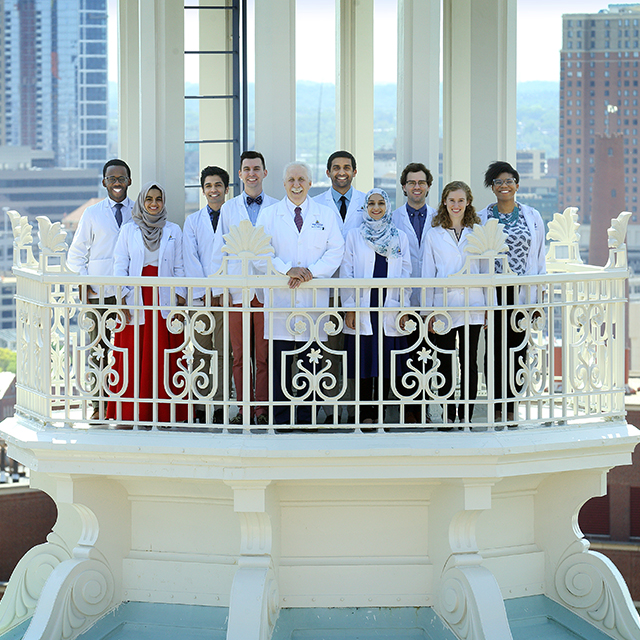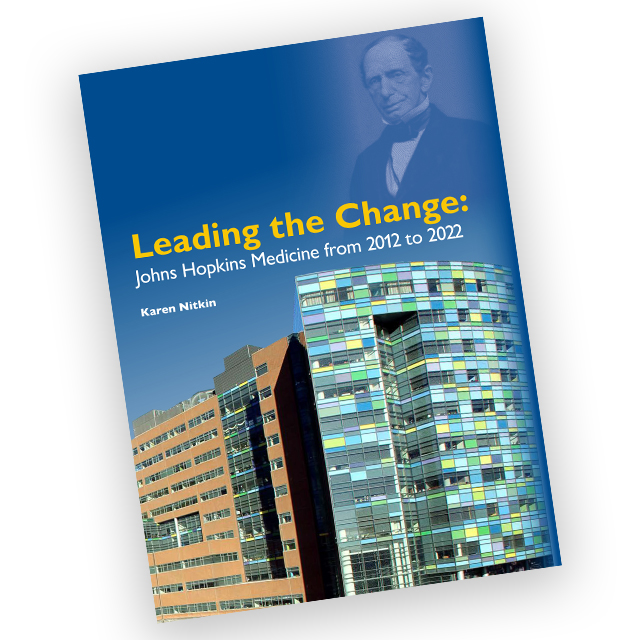When Paul Rothman began sitting for his official Johns Hopkins Medicine portrait six months ago, he wore a mask to protect against the COVID-19 pandemic that defined the final years of his tenure as dean of the medical faculty and CEO of Johns Hopkins Medicine.
At the 2023 Award and Portrait Presentations, he was mask-free and eager to see the finished portrait.
He had declined an advance peek, saying he wanted to be as surprised as the others attending the event in the Armstrong Medical Education Building on June 2. And he seemed pleased when he pulled the Hopkins-blue cloth off the easel at the front of the room to reveal the portrait. It showed Rothman sitting against a charcoal-gray background, hands folded in his lap, his expression thoughtful.
“I think it’s great,” he said.
The 42.5 x 32-inch oil-on-canvas portrait, which now hangs in the Mary Elizabeth Garrett Boardroom in the Miller Research Building, was painted by Lisa Egeli, who has also painted likenesses of Johns Hopkins surgeons and pioneers Levi Watkins Jr., and Julie Freischlag.
Also unveiled at the Johns Hopkins Medicine ceremony were Egeli’s portraits of Richard Bennett, president of Johns Hopkins Bayview Medical Center from 2009 to 2022, which is now on display at Johns Hopkins Bayview Medical Center; and Haig Kazazian Jr., professor of genetic medicine, pediatrics and molecular biology and genetics until his death in 2022, which was placed in the McKusick-Nathans Institute of Genetic Medicine.
The portrait of Mark Edward Anderson, director of the Department of Medicine and William Osler Professor of Medicine and physician-in-chief of The Johns Hopkins Hospital from 2014 to 2022, was painted by Judy Taylor and is displayed in the Department of Medicine offices at 1830 East Monument Street.
The Johns Hopkins portrait collection for the schools of medicine, nursing and public health grows every year, and now includes 370 renderings of people who either worked for or supported the institutions, says Andrew Harrison, cultural properties archivist.
Egeli says she typically works for about six months on each portrait, starting with a two-hour sitting, though in the case of Kazazian she had to work from photos, videos and conversations with his family.
The sittings, she says, help her get to know her subjects. She describes Rothman as “a very smart and sensitive and thoughtful man,” and adds: “There was a lot to talk about because of the extraordinary times through which he’d been leading. There was a kind of seriousness and weightiness to everything he’d been dealing with. I wanted to capture some of that and also capture the sense of how he viewed the challenges that he’d been facing.”
Rothman, a 1980 Phi Beta Kappa graduate of the Massachusetts Institute of Technology, earned his medical degree from the Yale School of Medicine and trained at Columbia-Presbyterian Medical Center before joining its medical school faculty. After serving as dean of the College of Medicine at the University of Iowa, he came to Johns Hopkins in July 2012. He retired at the end of June 2022.
In remarks before the unveiling, Landon King, executive vice dean of the Johns Hopkins University School of Medicine, touted some of Rothman’s accomplishments, including the institution’s first strategic plan, its Office of Well-Being and a new promotion path for clinical excellence. “And then we had the pandemic,” King said. “Johns Hopkins led throughout the pandemic, and Paul led Johns Hopkins. Thank you for all you have done to advance the mission of Johns Hopkins Medicine.”

Above: Landon King, left, helps Paul Rothman pulls the cloth off his portrait. Mark Anderson's portrait is behind them.


